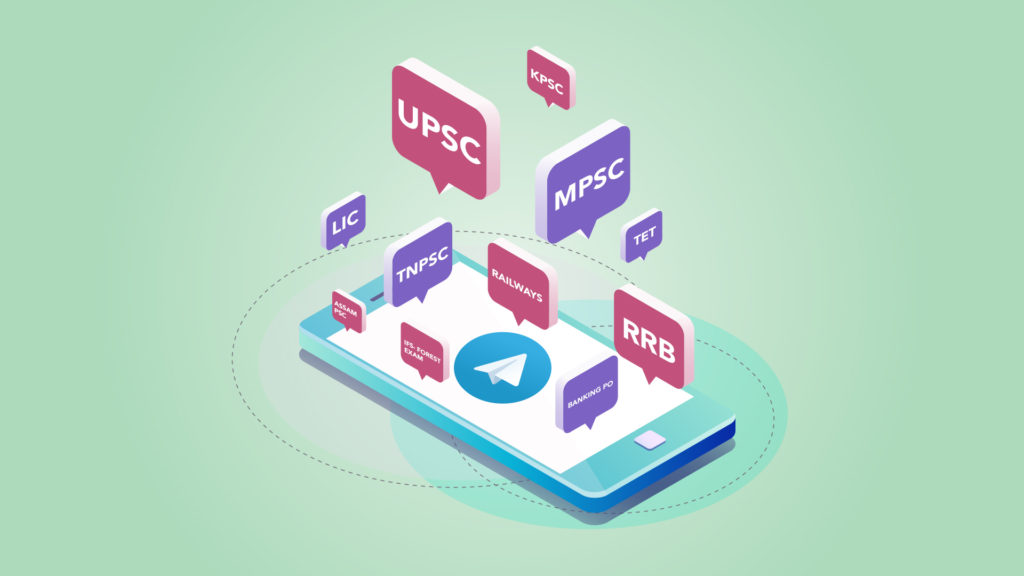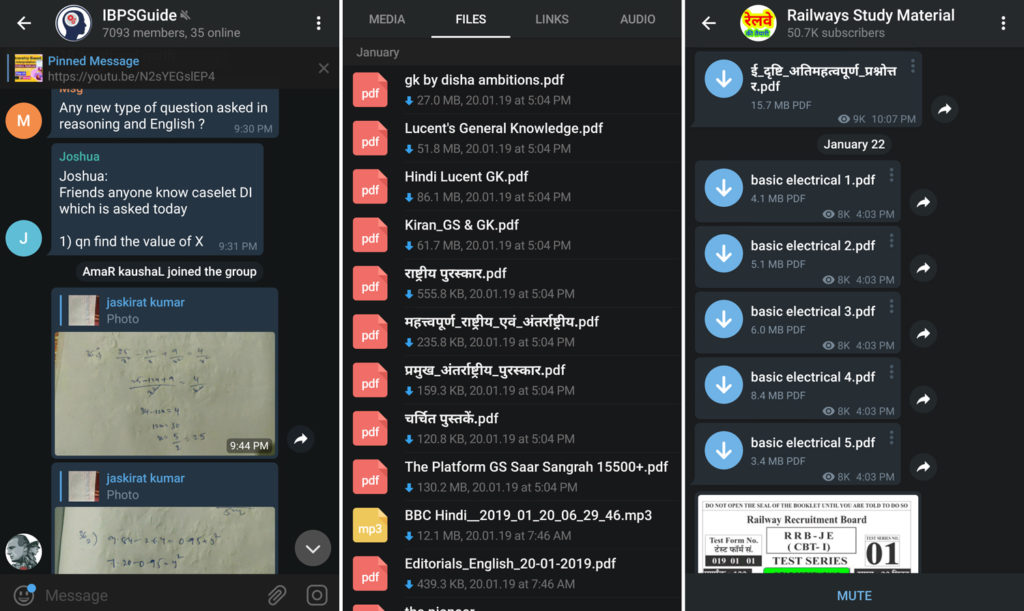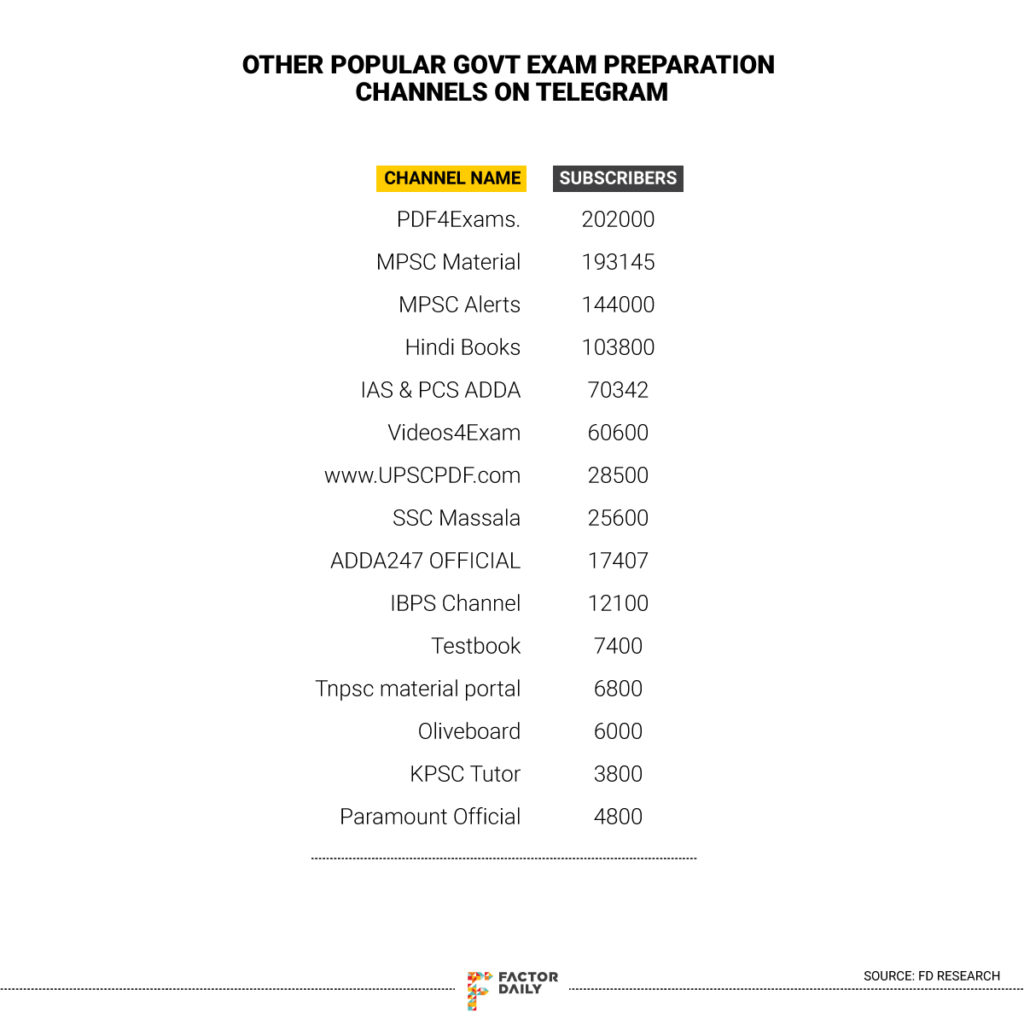[Analytics] Telegram turns go-to platform for test-prep in India but has a piracy problem

Mentor’ Harshit has a wee bit of Byju Raveendran in him. As a teenager growing up in Kanpur, Harshit Shukla was big into mathematics, teaching his friends and even helping set up a math club in school. Later, the B.Sc. Mathematics graduate began teaching large groups of people preparing for exams to government and public sector jobs. Shukla had found his calling. Nilesh Christopher specially for the Factor Daily.
But soon, the specialist test-prep tutor began finding traditional classroom-based teaching limiting. Several edtech startups were cropping up and Shukla was quick to hop on to online learning platform Unacademy, uploading lessons and preparation material for exams to bank and government jobs.
Two years ago, Shukla changed gears again, gravitating towards encrypted messaging platform Telegram to assist candidates better in their preparation. The 24-year-old has his own closed Telegram group called ‘Maths doubt’ and is among four mentors managing the open Telegram group ‘IBPSGuide’ that has more than 7,000 members across the Hindi-speaking belt trying to crack bank exams. (IBPS is short for the Institute of Banking Personnel Selection exam.)
For the uninitiated few, Telegram is a UK-headquartered encrypted messaging app founded in 2013 by Russian brothers Pavel and Nikolai Durov. It has over 2oo million monthly active users across 84 countries, including about 40 million users in India, making the country its largest user base.

Sure, these numbers pale against those of WhatsApp, which has 1.5 billion monthly active users globally, including over 200 million in India.
Even so, Telegram scores. Features such as supergroups that can accommodate up to 200,000 members each, channels that can broadcast to unlimited audiences, and file-sharing of up to 1.5 GB each, have made Telegram the go-to test-prep platform in India, particularly beyond the metros and other large cities.
To be sure, Telegram isn’t disrupting India’s online learning market despite the estimated thousands of test-prep-focused groups and channels on it. But the phenomenon has caught on so rapidly that edtech startups and coaching centres, too, are embracing the messaging app to reach larger audiences.
“Telegram has become a hangout for a lot of aspirants who want free material,” says Abhishek Patil, founder of Oliveboard, one of the largest online exam-preparation platforms in the country. “Especially for civil services, aspirants will find (a lot of material) on Telegram.”
Globally, Telegram is huge for sharing movies, music, humour and other entertainment-based content, with channels focused on these garnering millions of subscribers, Telegram analytics data show. But the increasing popularity of the platform has made it a hot source for pirated content.
While there is no formal data on the number of such test-takers, experts estimate about 70 million candidates every year in just the government, railways, bank, and insurance categories. Nearly 24 million people appeared for the Railway Recruitment exam alone last year.
Little wonder that the Indian test-prep market is projected to surge to $515 million by 2021 from $43 million in 2016, as per the ‘Online Education in India: 2021’ report by Google-KPMG.
Ridiculously high subscriber-to-impression ratios
Byju’s, India’s most-valuable edtech platform, and a few other startups including Unacademy and Cuemath have decisively won mindshare in the metros for school exams and tests for admissions to professional courses. But for test-takers in smaller cities and towns, Telegram is where content discovery, discussion and preparation happens in hyper-focussed groups and channels.
Take, for instance, ‘IBPSGuide’. At any given time in a day, 400 out of the 7,000-plus members in the group are online, comparing notes on quantitative aptitude problems, answering general knowledge questions, and engaging in spot quizzes every few hours. “Next quiz starts @4pm. Topic – Statistics and banking,” Supraja Supu, a group admin, posted recently. This was followed by a series of replies, “Tq admin.”
‘IBPSGuide’ is among thousands of community-driven exam preparation groups and channels that have sprung up on Telegram. Their memberships might seem insignificant when compared with the hundreds of thousands of subscribers for entertainment- and movies-focused groups and channels, but the most popular ones are almost always abuzz with activity. ‘India Bhai Channel,’ which focuses on preparing for civil services exams, has only 2,000 subscribers but the ‘Niti Aayog Strategy’ document that was shared on it had notched up more than 37,000 views. A ridiculously high subscriber-to-impression ratio.

Be it sourcing information for the railway officer exam in Bihar, the Tamil Nadu Public Service Commission, or the Railway Protection Force constable exam, over the course of the previous year multiple Telegram groups and channels have cropped up catering to the needs of test-takers in their own languages.
“In Telegram, it’s all about exchanging notes and clarifying doubts. There are no nonsensical messages such as good morning and good afternoon,” says ‘Mentor Harshit.’ “These groups are only for exam-related discussions, exam-related notifications, and exchange of handwritten notes, books, and reference materials.”
To stay on top of his game, Shukla sits for at least five tests every year – from the IBPS Clerk exam to an entrance test for the position of a scientist in the Indian Meteorological Department. Naturally, he aces them all. Shukla juggles teaching at coaching institute Royal Guidance Centre in Kanpur during the day, uploading videos on Unacademy in the evenings, and clearing doubts on Telegram. “To be on Telegram,” he says, “is a matter of brand-building.”
The lure of ‘free’
To understand what makes Telegram tick for serious test-takers, one has to be a part of the preparation madness.
Bhanu Shekhar, a 25-year-old from Patna, Bihar, cleared the Union Public Service Commission (UPSC) preliminary test for the Civil Services last year but failed to qualify in the main exam. He is now preparing for a second attempt. Shekhar is a member of 14-15 groups on Telegram where he gets his daily dose of news and exam updates, mock tests, and video lectures.
“I have been using Telegram for about 3 years. I didn’t join any coaching institute. My friend did and paid Rs 1 lakh as the coaching fee. I prepare with the same material as he does and I got them free on Telegram,” Shekhar says.
In test-prep circles, instances like these are more the norm than exceptions. The perks of flocking to Telegram include groups and channels on the app uploading paywalled content, private lectures by professors at top coaching institutes, and even PDFs of leading Indian newspapers.

VS Selvan from Kurinjipadi town in Tamil Nadu, who has opted for philosophy as his optional subject for the UPSC exam, was able to fish out a 60-video lecture series on the subject from one of several Telegram channels he is a part of. The series would have cost him at least Rs 50,000 were he to purchase it from a coaching centre, he says.
Telegram groups are more popular among users with relatively less purchasing power, says Alok Katiyar, chief executive of MadGuy Labs, a test-prep app for government jobs. “Most students are aged between 18 and 30 years. This is the middle range for Banking PO, Railways, SSC (Staff Selection Commission for government jobs), etc. They won’t spend anything more than Rs 1,000.”
MadGuy Labs has test-prep channels on Telegram in four different languages, with Kannada being the most popular. “My audience is tier-2 and tier-3 government job aspirants. If they are on Telegram, then I, too, should have a presence on Telegram,” Katiyar says, adding that he was surprised to find about 25,000 of the registered 85,000 users of his app having Telegram as well on their phones.
The Google-KPMG report on online education highlighted that nearly 46% of Indians were aged between 15 years and 40 years, where high aspiration but lower income is a good target market for online education. It added that with nearly 470 million smartphone users expected in India by 2021, test-preparation would be the fastest-growing category in online education between 2017 and 2021.
This growth, it said, would be an outcome of high adoption of online channels by an increasing number of candidates for competitive exams.
The underbelly of Telegram-learning
The mushrooming of test-prep Telegram groups that share access to exclusive video lectures, paid mock test questions, and paywalled information is an antithesis to captive knowledge-sharing in online learning platforms.
“Entire books are available as well,” says Shivam Nayyar, a civil service aspirant from Trivandrum, Kerala. “Ramachandra Guha’s recent book, ‘Gandhi: The Years That Changed the World, 1914-1948’ costs about Rs 1,000. I found a PDF of the book on Telegram and downloaded and read it for free.”
Telegram sells itself as the most secure messaging app. But its focus on privacy led it to gain notoriety as the messaging app of choice for terrorist groups seeking to garner support and recruit militants.
The other huge problem is piracy. The downside to an end-to-end encrypted platform that enables large-size file-sharing is the proliferation of groups and channels whose sole purpose is to illegally distribute movies, television shows, music, apps and other materials.
Education channels are no different. One of the most popular test-prep channels on Telegram, www.UPSCPDF.com, explicitly states in its description: “Free UPSC Materials for Needy Students. Just trying to help the Society Who Can’t afford Costly Study Materials.”
The admin posted a list of five links to a Google Drive account offering video classes by Lukmaan IAS, a popular tutor in the test circuit. “I hereby share all of these courses that people have been selling from quite some time, for thousands,” the admin posted, following which he/she shared a video to explain how to download these videos from shared drives.
A few hours later the admin had an update, “Google has blocked due to 1000s of downloads at the same time. They have stopped the link share.” A clear indication of Google algorithms blocking downloads of pirated materials. FactorDaily has reached out to Telegram for a comment and will update the copy once we receive a response.
Why Telegram, not WhatsApp or Facebook?
If a resource-rich peer group is the only differentiator for Telegram, shouldn’t platforms like WhatsApp and Facebook with larger networks be more popular among aspirants and institutes? Yes and no.
‘Supergroups’ on Telegram allow admins to pin on top important messages such as test announcements, delete messages for all members, view entire chat histories, and accommodate up to 200,000 people. WhatsApp limits the number of members in a group at 256.
Telegram has another powerful feature that many overlook, says Katiyar. It allows third-party developers to create bots. An admin can program a bot account for scheduled posts as well as respond to messages and mentions, which comes handy in managing and improving the usability and efficiency of groups.
“For a coder, it is a two-day job to write all the rules for the programmable bot,” Katiyar says. MadGuy Labs is programming a bot to eject rouge participants who post unrelated links in its study groups. “If one continues to post unrelated links, we are programming the bot to warn once, and if repeated, the participant will be automatically ousted.”
Telegram’s polling feature is also a powerful tool for engagement. Following a government job exam, candidates can create a poll to gauge the likely cut-off mark or how their peers fared. “Sometimes, there is an MCQ (multiple choice question) pop quiz session where we use polls. It is very useful and user-friendly,” says Gulshan Raj from Patna, who is preparing for a bank exam.
For incumbents, a growth hack
The primary incumbents in the government job test-prep market are coaching centres such as Paramount Coaching, KD Campus and VisionIAS that are deeply rooted in local ecosystems. Many of these institutes have started blogs and Telegram groups and channels where they share materials. Online platforms include the likes of Testbook.com, OnlineTyari.com, Sarkaripariksha.com and MadGuy Labs.
For institutes like IBPSGuide in Erode, Tamil Nadu, Telegram serves as a growth hack. “We had 100 different WhatsApp groups until a while ago. Now, we have consolidated on Telegram. An open group where students help each other brings more traffic to us. Also, despite being in Erode, 80% of my registered students are from North India,” says Sukumar Elangovan, head of IBPSGuide.
But when it comes to content consumption, the most popular platforms for test-takers are video lectures on YouTube and Unacademy.
Sequoia-backed Unacademy has become India’s largest learning platform and has been onboarding educators to teach for tests for government and public sector jobs. It has more than 1,600 educators creating tutorial videos on the platform. Though Unacademy does not have a popular Telegram Channel, CEO Gaurav Munjal says “many of the educators on Unacademy have their own Telegram channels to distribute their lecture videos.”
To be clear, Telegram is not eating into the market share of any of the incumbents. On the contrary, it’s aiding them project their content to larger audiences.
“Telegram is a viral customer-acquisition platform for us,” says Bhola Meena, CEO of OnlineTyari. “This is the best discovery platform and distribution channel. But over time, you have to get the user who views your content to come to your platform.”
The OnlineTyari website and app together have over 8 million registered users, including 40,000 paid subscribers.
Oliveboard’s Patil says the startup acquires customers by pushing content suited to a specific medium. “We use Telegram the way students want. They want us to share PDFs, mock question papers, and other study materials on Telegram. On channels like Facebook and Instagram, we share information, since these are largely visuals and images.”
Oliveboard has about 4 million registered users on its platform and nearly 6,000 subscribers for its Telegram channel. “Telegram started becoming popular among test-takers only about a year ago. That is around the time we got on the platform,” says Patil. “All other players, too, have their own Telegram channels and participate in open groups as well.”
Patil clearly isn’t perturbed by Telegram’s growing popularity as a test-prep platform. Sure, “many rely on Telegram to get some portion of their notes, materials, mocks, etc.,” he says, but “I haven’t heard of any instance where one prepared only on Telegram. It is still an unstructured platform.”
Nilesh Christopher